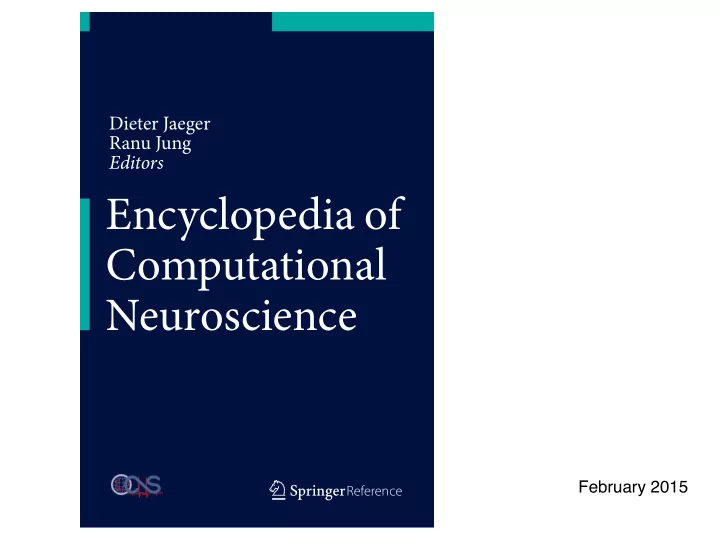

Dieter Jaeger Ranu Jung Editors Encyclopedia of Computational Neuroscience February 2015 1 3 Reference
Encyclopaedia • According to Encyclopaedia Britannica: reference work that contains information on all branches of knowledge or that treats a particular branch of knowledge in a comprehensive manner. � � • Encyclopaedias have existed for more than 2,000 years. The oldest still in existence, Naturalis Historia, was written starting in ca. AD 77 by Pliny the Elder. � � • The word encyclopaedia is derived from the Greek enkyklios paideia, “general education,” and it at first meant a circle or a complete system of learning. � � • Paul Scalich, a German writer and compiler, was the first to use the word to describe a book in the title of his “Encyclopaedia; or, Knowledge of the World of Disciplines, Not Only Sacred but Profane…”, issued at Basel in 1559. � � • The many encyclopaedias that had been published before this time either had been given fanciful titles (Hortus deliciarum, “Garden of Delights”) or had been simply called “dictionary.” � � • Scalich’s pioneer use of the word “encyclopaedia” did not find general acceptance until Denis Diderot made it fashionable with his historic French encyclopaedia, the Encyclopédie.
What is the encyclopaedia of computational neuroscience • Series of articles from neuroscientists, covering neural models, analytical and numerical techniques, neural simulation tools, data analysis tools, databases of models and datasets… � � • Written for the whole community, from graduate students to more advanced researchers � � • First series in October 2014. Updatable
What is the encyclopaedia of computational neuroscience • Series of articles from neuroscientists, covering neural models, analytical and numerical techniques, neural simulation tools, data analysis tools, databases of models and datasets… � � • Written for the whole community, from graduate students to more advanced researchers � � • First series in October 2014. Updatable, so complementary to other encyclopaedic resources (if Peter D. is not around) � � • How does it compare to Scholarpedia (http://www.scholarpedia.org/article/ Encyclopedia:Computational_neuroscience)?
Examples • Fokker-Planck Equation (Nicolas Brunel and Vincent Hakim) � � • Short-term Plasticity, Biophysical Models (Robert Rosenbaum) � � • State-Space Models for the Analysis of Neural Spike Train and Behavioral Data (Zhe Chen and Emery N. Brown) � � • Sensory Coding, Efficiency (Franz Weber and Christian K. Machens) � � • Computational Models of Neuromodulation (Angela J. Yu) � � • Deep Brain Stimulation, LFP analysis, models of decision-making, Brain-Machine interfaces…
Example: Fokker-Planck Equation (Nicolas Brunel and Vincent Hakim)
Where can I find it? www.springer.com/us/book/9781461466741
How does it compare to Scholarpedia? • More expensive � � • Broader but less detailed � � • No mention of peer-reviewing…
…
Recommend
More recommend